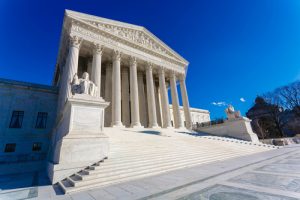
The Supreme Court issued its much-anticipated decision in Janus v AFSCME today. In a 5-4 decision, the majority held that forcing public employees to pay “agency fees” to their union, even if they choose not to join and strongly object to the positions the union takes in collective bargaining and related activities, violates the free speech rights of nonmembers by compelling them to subsidize private speech on matters of substantial public concern.
In reaching this holding the majority overturned Abood v. Detroit Bd. of Ed. (1977) 431 U. S. 209, which for 41 years has sanctioned the collection of agency fees as a careful balance between an employee’s first amendment rights and the right of public employers to manage their workforces. In overturning Abood, the majority rejected the arguments that agency fees are necessary to achieve “labor peace” and to avoid free-riders. According to the majority, many states and the federal government don’t allow agency fees yet have been able to achieve “labor peace.” The majority was also dismissive of the “free-rider” issue, stating that,
Petitioner strenuously objects to this free-rider label. He argues that he is not a free rider on a bus headed for a destination that he wishes to reach but is more like a person shanghaied for an unwanted voyage.
The majority asserted that in right-to-work states unions are clamoring to achieve exclusive representative status despite the threat of free-riders.
The dissent strongly rejected the majority’s criticism of Abood. On the issue of free-riders, the dissent asserted that the majority avoided the key question, “which is whether unions without agency fees will be able to (not whether they will want to) carry on as an effective exclusive representative.” As to this question, the dissent argued that agency fees the number of non-union members will surely increase. “And as more and more stop paying dues, those left must take up the financial slack (and anyway, begin to feel like suckers)—so they too quit the union.”
But the dissent reserved its strongest criticism for the majority’s refusal to respect stare decisis, the doctrine that established precedent should be allowed to stand even if the soundness of the decision comes into doubt. Justice Kagan’s dissent stated that, “Rarely if ever has the Court overruled a decision—let alone one of this import—with so little regard for the usual principles of stare decisis... Reliance interests do not come any stronger than those surrounding Abood. And likewise, judicial disruption does not get any greater than what the Court does today.”
Comments:
- I will try to have more on the impact of this decision in the coming days. But here are some initial thoughts.
- This decision is not a surprise to anyone following this issue. Indeed, as Justice Alito noted in this majority opinion, he and the other conservative Justices have hinted at this outcome for some time.
- Timing: The biggest question I’ve been getting is when does a public agency have to stop collecting agency fees. I was hoping that the Court would give some guidance on this question given that people have relied on Abood for 41 years. But there was none. But it’s crystal clear that the decision holds that such fees are unconstitutional. So my advice: stop collecting agency fees as soon as practical. I say as soon as practical because with most payroll systems it’s not possible to do it today; even though most employers collect the fees in arrears the payroll for the end of the month has been submitted and/or processed for most public employers. So practically, it means stopping the collection of fees by the next pay period in July.
- What notice to the union? This is the other question I’ve been getting. Obviously, stopping the collection of agency fees is mandated by law and therefore not a “negotiable” subject of bargaining. But there might be negotiable effects. Ideally public employers would have been in touch with their unions to discuss this already. If not, it would be wise to reach out to the unions as soon as possible. [Note: Some MOU severability provisions may require a meet and confer if any provision-such as an agency fees requirement -becomes unlawful.]
- SB 866. The Governor signed this bill today. Under SB 866, the unions will tell employers who to deduct dues/fees from. So once an employer stops collecting agency fees, most will want to wait to hear from the union on re-starting collections. The good news with SB 866 is that there is a statutory indemnity clause for employers.
- Communicating to employees. Be very careful on this. I think an employer can inform agency fee payers that it will stop collecting such fees as a result of Janus. But anything more than that will have to comply with Government Code section 3550 and SB 866. Section 3550 prohibits deterring employees from becoming members of a union. SB 866 requires that employers meet and confer with unions before sending any “mass communication” to employees “concerning public employees’ rights to join or support an employee organization, or to refrain from joining or supporting an employee organization…”
- These are my initial thoughts. I and other members of my firm will be providing additional thoughts and tips soon. I’ll provide a link to that guidance when it becomes available.
This entry was posted in Court Decisions, News.
Previous post: Supreme Court Issues Janus Decision; Governor Signs SB 866
